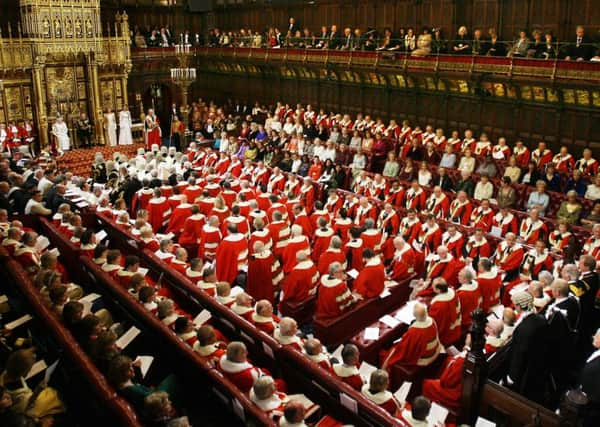Leaders: Lords needs uplift and support to survive


The Sewel disgrace has fuelled calls for immediate reforms lest public support and respect for the institution sinks lower.
The House already comprises around 790 peers, well in excess of the number of MPs. Despite widespread acknowledgement that a slimdown is needed, Prime Minister David Cameron has signalled his intention to appoint even more members while he has set his face against further reform. This is dangerously short-sighted.
Advertisement
Hide AdAdvertisement
Hide AdWhile the government is understandably reticent about embarking on reform of the structure and powers of the Lords, there are a number of changes that would meet with widespread support.
The House performs a vital function as a revising chamber, drawing on experience and expertise from scientists, academics and business leaders beyond the political realm. Such scrutiny helps ensure legislation is robust, informed and lasting.
But more clarity is needed on the grounds of recommendation for membership. Is it sufficient grounds for membership that an individual has given a large political donation, or that an MP has obligingly stepped aside, or that someone has served years on the board of a quango? What was the basis of Tony Blair’s recommendation of Sewel, a politics lecturer, other than that he was an obliging chum of the Labour elite?
The entrepreneurial credentials of Michelle Mone may not be in doubt. But there are thousands of successful businessmen and women whose talents are not so recognised. Is her mooted appointment a reward for her contribution to British fashion and design, or her loyalty to the Prime Minister and her support for Better Together during the independence referendum campaign? Greater transparency around the criteria by which nominees are proposed for membership would help secure greater support for the House.
More ambitious reform of the Lords will take years. But there are modest and practicable changes that can be made. The number of new appointments can be made dependent on seats falling vacant. As the Sewel debacle has exposed, rules on conduct and standards of behaviour need to be tightened.
A useful start can be made on the curtailment of attendance and accommodation expenses. Lord Sewel, for example, claimed mopre than £400,000 of expenses and allowances between 2001 and 2010 alone. Lord Hanningfield was exposed for turning up, getting his money and promptly leaving again – even after he had served a prison sentence for expenses fraud.
We must not let the cheats prosper
New leaked documents suggest an extraordinary extent of cheating by athletes at the world’s biggest events. According to expert appraisal of the data, one third of the medals, including 55 golds, in endurance events at the Olympics and World Championships between 2001 and 2012 were won by athletes who showed suspicious tests. More than 800 athletes recorded blood tests described by one expert as “highly suggestive of doping or at the very least abnormal”. Ten medals at London 2012 are said to have been won by athletes with dubious test results. And in other international sporting events, leading British athletes lost out to rivals who have been under suspicion.
It is a deeply worrying catalogue of suspected abuse. We know of spectacular individual cases: Lance Armstrong, once a hero, is now disgraced. But the scale of doubt and suspicion is far greater than just a few wayward individuals.
Advertisement
Hide AdAdvertisement
Hide AdDespite repeated clampdowns, cheats are prospering. Athletes who play by the rules become disillusioned, suspicion hangs over those who are innocent, and the public becomes ever more cautious over outstanding performance.
Never before has firm action and leadership been more needed. Lord Coe, who is standing for election as president of the International Association of Athletics Federations (IAAF), has pledged to establish an independent anti-doping agency within 100 days. This would be a promising start. But lasting results are going to require a continuous process backed by tough sanctions. We owe it to the next generation to make sport as clean as possible.